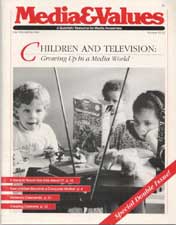When Kids are Watching: Confessions of a SitCom Producer
|
Reprinted with permission from New Perspectives Quarterly. This article originally appeared in Issue# 52-53
|
The creator of Family Ties reflects on who's in the audience
The insidious thing about television's invasion of the home is not the message of its programs, but the audience that is watching. The sobering reality a prime-time television producer must face is that eight- and 10-year-old children are left alone to watch TV by themselves. How do children, lacking in mature judgment, process what they see? How do they tell good from bad, truth from fiction, fantasy from reality? Without parents to guide their interpretations of the wild onslaught of information flowing out of that wonderful yet menacing box, what is presented on TV becomes the primary source of the child's developing world view. The first reaction of a prime-time producer to this realization is indignation: I didn't ask to have a show that eight-year-olds are watching by themselves. Why should I be responsible for how they translate what they see? They shouldn't be watching by themselves.
But, they are. One can't avoid that fact and must face it responsibly. Many times during the course of Family Ties, we had to take that lone eight-year-old viewer into account. Should we use that ambiguous joke about drug use, which didn't come down heavily with a Nancy Reagan "Just Say No" message? What if the subtlety of our more dramatic and artful approach was lost on the kid whose mother or father wasn't there to make the message clear? In this case, like many others, we ended up dropping the joke altogether. Given the growing weakness of the family in America today, I think it is incumbent upon producers to be responsible and take the nature of the audience into consideration.
"The widespread use of television is equivalent to a broad social decision to allow young children to be present at wars and funerals...criminal plots and cocktail parties."
—Joshua Meyrowitz, No Sense of Place
Having said this, we must acknowledge that the people producing shows in Hollywood also have a strong argument. The people doing Dallas, for example, have the right to say, "Hey, this isn't for kids. They shouldn't be watching. If I let that concern overwhelm my show I'm going to lose my audience." And, if you're doing Miami Vice at 10 p.m., is it the fundamental responsibility of the producer to take into account the eight-year-olds who shouldn't be up at that hour watching TV by themselves? However, the closer we get to the prime-time hour— in the 8 or 8:30 p.m. time period— the greater our sense of responsibility to the audience should be.
In the end, the fundamental responsibility must lie with the parents, not the producers. In my own admittedly privileged case, if my young daughter wanted to watch TV in our house, she would have to make a case for turning it on: why did she want to watch it, what did she think about what she saw, why should we allow this into our home? So, as much as I believe in the responsibility of those of us on the production end, the real issue is the strength of families, not the weakness of programming.



